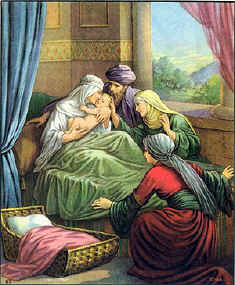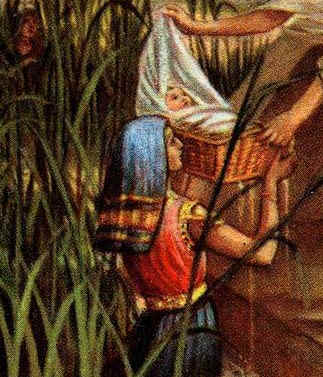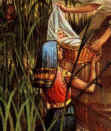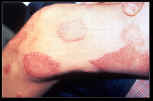

Close this window to return to previous page.
- or -
Click HERE to go to the list of lessons for this course.
LESSON FOUR
WOMAN EIGHTEEN

Miriam, the sister of Moses
The gifted leader that rebelled.
I. She was the daughter of Amram and Jochabed, Levites, and the sister of Moses. (Ex 2:4; Num 26:59)
|
II. She was obedient and faithful in her duties. |
 |
|
|
A. |
She was an obedient and faithful child in her duties to her family. (Ex 2:4,7-8) | |
| B. | She was obedient and faithful as an adult in her duties to God. (See the next section for development of this thought.) |
|
| III. | She was a leader in Israel. | |
|
A. |
She was mentioned as one of the leaders. (Micah 6:4) | |
|
B. |
She had the gift of song. (Ex 15:20-21) | |
| "prophetess" Heb n@biy'ah {neb-ee-yaw'} generally, ancient type endowed with the gift of song (generally) inspired woman; by implication a poetess, (sometimes) the wife of a prophet She led the other women in songs of praise to the Lord. |
||
|
C. |
She was a prophetess. (:20) | |
| In some commentaries, such as Jamieson, Fausett, and Brown, it is stated that Miriam was called a "prophetess" because she was "so called from her receiving divine revelations" and they refer to Num 12:2 where it is stated that Miriam and Aaron said "... hath he (God) not spoken also by us?" Therefore, we must conclude that, at some time, God did speak through Miriam. The term, prophet(ess) is much misunderstood today. There are many who call themselves prophets and prophetesses; thinking it means they can give new revelations from God. When the misunderstood term, prophet(ess) is combined with another misunderstood term, inspiration, you wind up with all sorts of unbiblical heresies. Because our current study concerns Miriam, then we will confine our brief discussion to the misunderstood term, prophetess, for that is what she was called. To begin with, if one truly understands the definition of the word "prophet" or its feminine form, "prophetess," then it would not seem unusual for her to be referred to in this way. If one does not understand the word, then many fancies can attach themselves to Miriam and prophets and prohetesses in general. By definition a prophet is, simply, "one who speaks for another." This is easily seen if one studies the term, and the scriptures and their context where the term is used. Many believe that prophet means someone who foretells the future. A study of the term, however, shows that not all who were called prophets foretold future events. Miriam is such an example along with many others. There is no record of any prophecies concerning the future made by her in the Bible. In fact there is no record of any of her prophetic utterances- past, present, or (at that time) future. Another such example is Aaron,, who is called the prophet of Moses in Ex 7:1. He was called the prophet of Moses because he spoke for Moses. And Moses was called a prophet because he spoke for God. (Deut 34:10) And Moses told us of the past, not the future, as he relayed the Genesis account to us from God. Under this biblical definition of a prophet, as "one who speaks for another," anyone who gives forth the words of God is a prophet of God. And this is true today as much as it was in Miriam's time. However, the process is different. Whether the words of God were given by direct revelation, as in the Bible through the prophets and prophetesses, or, today, when people give the Word of God, and do so exactly as it is already revealed, complete and in written form in the Bible, as they speak for God, all are prophets or prophetesses of God. Those who claim direct revelation today, in the way that it was given to Mirian, Moses, Aaron, and others in the Bible, make that claim because they do not believe that the Bible is the complete, revealed, Word of God. To be a biblical prophet or prophetess and operate in a biblical manner, they must understand that in the Bible the prophets declared what God wanted revealed because the Bible was not yet complete. As prophets today, we declare what God has already revealed in His completed Word. And the Bible declares we can do no more and we should do no less. Today we are called "preachers" of God instead of "prophets," but the job is the same. Through Mariam we learn both lessons- say no more and say no less than what God wants. For her story shows us that she reaped the rewards for doing both. Actually, we should say that she, as an example to us, reaped the reward of blessings when she spoke no more than what God wanted spoken, as in the song she led the women to sing here in Exodus, and she reaped the direly negative consequences when she spoke more than what God wanted, as is recorded in Numbers and Deuteronomy. |
||
| IV. | She was an example to the children of Israel-albeit a negative one. | |
| She was held up as an example to encourage obedience. (Deut 24:8-9) . | ||
| V. | She angered God by speaking against His appointed authority in Israel, Moses. (Num 12:1-15) | |
|
A. |
She and her brother, Aaron, murmured against Moses. (:1-3) | |
| 1. Partly for racist reasons. (:1) | ||
| 2. Partly for religious reasons. (:2-3) | ||
 |
||
|
B. |
God was angered by this rebellion against His man. (:4-9) When they rebelled against Moses, God's appointed leader who was exercising the delegated authority of God himself, they actually were rebelling against God- the one who had delegated the authority to Moses. Even in old English law we find the adoption of this biblical principle. "An attack on the King's soldiers is the same as an attack on the King himself." That is the principle here in the story of Miriam and her attack against Moses. It was an attack on the designated representative of the King, the soldier; and, therefore, it was the same as an attack on the King himself. In this case the soldier was Moses and the King was God. |
|
| C. | She was cursed with "leprosy" for her rebellious murmuring against authority. (:10) Actually the word in Hebrew is, "tzaraath" meaning, by the context here as concerning Miriam, a skin disease. The disease itself, as described in the Bible, can attack humans, clothing and houses. Which serves to differentiate it from the disease we know of as leprosy. The root of the word tzaraath means "smiting" and the Jews believe it is a curse brought on by sin. Thus it is viewed by them as a spiritual matter, tzaraath, rather than a physical matter like leprosy. However, leprosy is the closest English word, and is the one used in the English Bible because it also is a skin affliction, and that is what Miriam had; and there really is no English word that means exactly what tzaraath means. One Midrash source states that it is only brought on by one particular sin, "an evil tongue," while the Talmud states that it can be brought on by any one of 7 sins. (For a list of the 7 sins, see the reference below- "further information on the actual disease.") In the case of Miriam, it was the sin of "an evil tongue" which both groups agree upon as a reason for God to bring about "smiting" (tzaraath). It was first translated as the word "lepra" in the Septuagint; from which we receive the word in the English translations of "leprosy", also a disease of the skin, as the closest English word concerning a skin disease. For more information on the actual disease, tzaraath, click HERE. |
|
| D. | She was then healed when the one she murmured against (Moses) prayed for her. (:11-13) Aaron, as high priest, couldn't touch his sister because it would have made him unclean; and, thus unable to perform his priestly duties. Knowing that he too should have been cursed with tzaraath but wasn't, and seeing the "smiting" of his sister while he was spared from what would have been a just smiting of himself, must have been a heavy spiritual blow to Aaron. We may conjecture that he was spared tzaraath only because he was the high priest and if he had been struck down with it he wouldn't have been able to perform his priestly duties. But, whatever the reason may be that he was not struck down, it is obviouse that he had to bear the burden of knowing that he should as surely have been, and that knowledge must have been increased multiple times by the sight of his sister turned, as he should have been, "leprous (tzaraath), white as snow: and Aaron looked upon Miriam, and, behold, she was leprous." This can be seen in verses :11 where he includes himself as a partaker of the transgression ("us" and "we") and a deserver of the same just punishment visited upon his sister Miriam, as he beseeches Moses "Alas, my lord, I beseech thee, lay not the sin upon us, wherein we have done foolishly, and wherein we have sinned." Obviously he knew that he had sinned along with Miriam. Perhaps he was afraid he would be "smitten" next with the disease. This might explain the quickness with which he spoke to Moses. However, this possibility is only conjecture. It is, however, a Jewish belief that forgiveness from God for evil speaking could not be asked until after the perpetrator had sought and received forgiveness from the one they had spoken evil of. Therefore, Aaron asking Moses to not lay the sin upon him and his sister would be the necessary prelude to asking forgiveness from God. In the end, Aaron received more than forgiveness from Moses for himself and his sister; he received the prayer from Moses' own lips to God on behalf of his stricken sister that she might be healed. Tzaraath today: The Jew, even today, believes that although a person is encouraged to go to a doctor for medical help for any affliction, they also believe that the one stricken with tzaraath must go to a Kohen (someone of the priestly line) in order to have the curse of tzaraath examined so that they, hopefully, can officially declare their repentance for the sin and, after a time of cleansing (such as the seven days Miriam spent outside of the camp) eventually be deemed (spiritually and according to the precepts and demands of The Law) "clean" once again. The ritual is quite involved so we will not go into it in this study. |
|
| E. | After a time of cleansing she was restored. (:14-15) She was shut out of the camp for 7 days and the People waited for her before moving on. |
|
| VI. | Miriam died and was buried in Kadesh in the desert of Zin. (Num 20:1) Death is certain for both the rebellious and the righteous as well as the repentant. There are two places where all are equal in this life- at the cross and at the grave. It is certain however, that as Christ went to the cross before He went to the grave, so it is better for us to go to the cross before going to our grave. As Miriam received God's forgiveness and received restoration before going to her grave, so should we. |
|
Summary: From Miriam we can learn at least four things:
One: That no matter how gifted you are as a leader in God's service, you still must serve willingly under whatever authority God has placed over you.
Two: We can learn that there will be blessings from God for obedience and there will be cursing from God for disobedience and rebellion- no matter who you are.
Three: We also see in the story of Miriam that God will show mercy to the unrighteous in answer to the prayers of the righteous.
Four: Last but not least we see that after a time of cleansing by God, there can be complete restoration even for the willfully rebellious.
LESSON FOUR TEST
WOMAN EIGHTEEN
This test is "open
book," which means you may
use your study materials while taking this test.
If you fail this test then you must wait a minimum of one day before you can
retake it. During that time you are required to go to the textbook and the
Bible, whichever is appropriate, and find the correct answers to every
question missed on the failed test. You may use the copy of the
failed test that was sent to you and refer to it for the correct
answers, which are included on it, to verify that you have
found the correct answers in your study materials.
Once you have found all of the correct answers
and waited the required one day, then you
may retake the failed test.
You cannot proceed to the next Lesson until the day after you have
passed this Lesson Test and found all of the correct answers
in the textbook or the Bible, whichever is appropriate, to
all questions missed on this test even though
you received a passing score.
Close this window to return to previous page.
- or -
Click HERE to go to the list of lessons for this course.